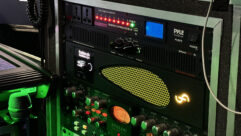Fourier Audio announces the PLASA launch of a software update for the transform.engine that enables VST3 plugin states to be stored and recalled during live productions. A free download at www.fourieraudio.com, transform.engine v1.2 allows the user to easily recall Cues over a MIDI connection from either a mixing console or show control software, as well as provides support for multiple Cuelists, permitting multiple users to control plugin states in different chains—or even the same ones—on a single server.
“The transform.engine has already proven itself as a highly reliable audio processor for running plugins during live shows and broadcasts, but the single biggest request that we’ve heard from our users is that they’ve wanted ‘snapshot’ recall of their settings,” says Fourier Audio Co-founder Henry Harrod. “Our new software delivers with the introduction of ‘Cuelists.’ If, for example, you have reverbs on a show and each song has different reverb times, with Cuelists, you can now quickly and easily recall those plugin parameters between numbers.”
The update also enables Fourier Audio’s customers to build on the multiple-client functionality of the product. Harrod describes: “When different engineers—front-of-house and monitor, for example—are sharing a single transform.engine, they can each have unique Cuelists targeting different chains at the same time.”
The new Cuelists feature has successfully passed the rigorous automated test procedures that Fourier Audio performs on all products, and the sound and dependability of the transform.engine when managing Cues are “rock-solid, just like the rest of the device,” Harrod adds. “From live music tours and festivals to global broadcasts to major theatrical events, all of our customers will now be able to create even more dynamic sonic experiences across their sets, programs, and productions—plus, they’ll have the peace of mind in knowing that the reliability is absolutely there.”
As part of Fourier Audio’s DiGiCo integration, a specific mode responding to MIDI Controller Change messages on Controller Numbers 16-19 is available to provide a streamlined and efficient workflow. For other applications, Cues (contained in Cuelists) on the transform.engine can also be triggered via a direct MIDI cable connection transmitting MIDI Note On, Program Change, or NRPN messages.
About the transform.engine
Housed in a 2U touring-grade chassis with dual redundant power supplies, the transform.engine is a Dante-connected server designed to run VST3-native software plugins in a live environment, bringing premium studio software to live sound and broadcast applications. The device gives engineers and creatives access to the very best studio-grade processing on a robust platform that is specifically designed for the rigors and complexities of live productions.
For paramount reliability, Fourier Audio’s patent-pending audio software engine provides a robust sandbox with plugins ring-fenced from each other. Should a plugin crash, the rest of the system will not only be unaffected, but the transform.engine will immediately restart that plugin, quickly restoring the original integrity of the mix.
The Fourier Audio device is fully capable of operating in conjunction with virtually any professional digital console on the market via Dante, using the Windows/macOS application to control the engine. The transform.engine can also process audio standalone with no computer required. Controlled remotely by a Windows/macOS application, with plugin user interfaces “teleported” and controlled in ultra-low-latency over the network, the product has been tuned to deliver the lowest-latency solution on the market for hosting VST3 plugins, while preserving the reliability and performance of the server.
For more details on the Fourier Audio transform.engine, visit www.fourieraudio.com.










